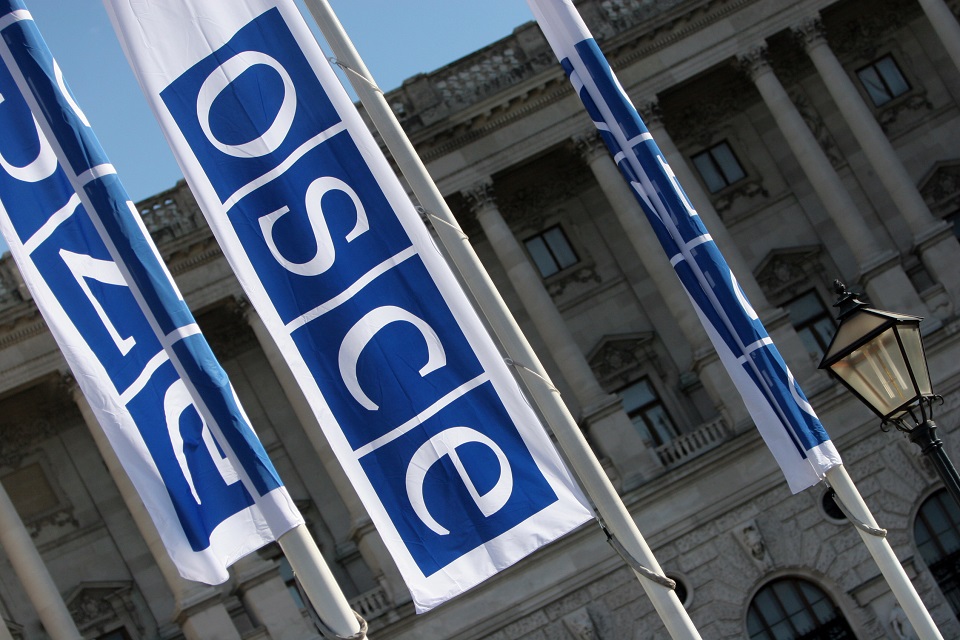UK concerned about Russian violations of international humanitarian law: UK statement to the OSCE
Ambassador Neil Bush criticises the Russian government and military for reported violations of international humanitarian law in Russia's war against Ukraine.

Thank you to both co-chairs for hosting this joint Permanent Council-Forum for Security Cooperation (PC-FSC) meeting on this important issue. I wish to thank the two speakers for their interventions. The UK continues to fully support the crucial work of the International Committee of the Red Cross (ICRC) and its unique role in upholding International Humanitarian Law (IHL). It is vital that we all uphold our commitments on IHL.
Since the start of Russia’s invasion of Ukraine, we have been seriously concerned about Russian violations of International Humanitarian Law. The two Moscow Mechanism reports show we were right to be concerned. The reports noted “clear patterns of serious violations of IHL attributable mostly to the Russian armed forces”. Including the magnitude and frequency of the indiscriminate attacks. Carried out against civilians and civilian objects. Reports of torture. The execution of civilians. Unlawful detention. Enforced disappearances. Targeting civilians on their streets, in their cars, on their bicycles, on their balconies and in their homes. Victim-activated booby traps. The rape of women. The rape of children. Violence towards men. The killing of journalists. Targeting of hospitals, of schools. The use of cluster munitions. Shallow graves. The threat of cholera. The use of filtration centres. These constitute an affront to humanity.
Furthermore, ODIHR’s Interim Report expressed “clear concern” for Russia’s “general disregard” for the “basic principles of distinction, proportionality and precautions set out by IHL, which may amount to war crimes and crimes against humanity”.
Mr Chair, the targeting of critical civilian infrastructure has continued since these reports were published. Russia is trying to maximise civilian hardship over winter. Last week up to 10 million households were left without electricity. Water supplies have been hit. And we know that vulnerable groups suffer disproportionately – be it the elderly, those with medical conditions or disabilities. As President Putin will be aware, attacks which disproportionately kill civilians, and destroy objects indispensable to the survival of civilians, are prohibited under international humanitarian law. Evidence of war crimes has been mounting including in Bucha, Irpin Borodianka and Izyum with more and more allegations coming to light in Kherson. These actions are morally bankrupt.
Both Moscow Mechanism reports document acts of sexual violence carried out by members of the Russian Armed Forces. This evidence exists because of the bravery of survivors, who, by telling their stories, break down stigma and enable justice. Their courage is striking when juxtaposed with the cowardice of their attackers, who hide behind propaganda spread by Russian government officials. Denying crimes of sexual violence is tantamount to defending them. Colleagues, I repeat the message that the UK has delivered many times: the use of sexual violence as a weapon is a war crime. We, the international community, will end impunity for sexual violence and hold those responsible to account.
And it is not only civilians suffering. There is mounting evidence that Russia has failed to abide by its obligations under the third Geneva Convention – that all prisoners of war should be treated humanely, afforded appropriate medical treatment and basic necessities, and be protected from humiliating and degrading treatment. The UN Officer of the High Commissioner of Human Rights has documented the use by Russian forces in Ukraine of prolonged beatings, dog attacks and putting people in stress positions. Mr Chair - Wars have rules and these prohibit a detaining power from prosecuting prisoners of war for having participated in hostilities, or for lawful acts of war committed in the course of armed conflict.
We need accountability. Those members of the Russian Government and individual members of the Russian military who have breached international humanitarian law and committed war crimes must be held to account. We are working through the OSCE, with Ukraine’s Prosecutor General and with international bodies like the International Criminal Court to pursue accountability for these crimes. The countless victims of Russia’s illegal invasion deserve justice.
In closing, every day since the 24 February, we have seen the tragic consequences in Ukraine of Russia’s aggression, but every day we have also been reminded of the courage and resilience of the Ukrainian people. The United Kingdom will continue to do everything we can to support Ukraine, including through diplomacy, humanitarian aid and supporting accountability. The single biggest step to preventing further breaches of international humanitarian law in the OSCE area would be for Russia to withdraw fully and unconditionally from the whole territory of Ukraine. Let us ensure that becomes a reality.